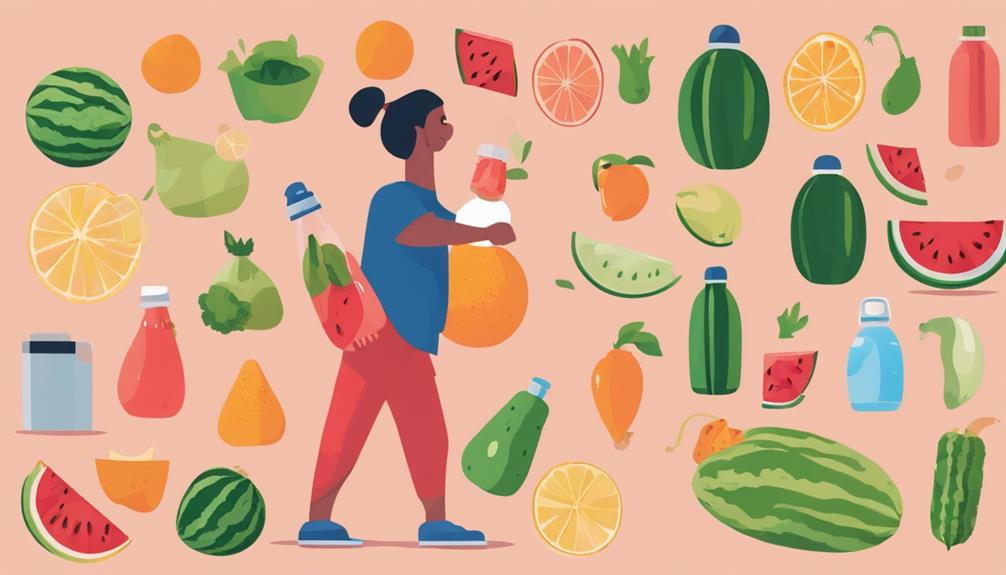What Is the Importance of Hydration, and How Much Should I Drink?
Did you know that your body is made up of about 60% water?
Staying hydrated is crucial for your overall health and well-being.
But how much water should you be drinking each day to keep your body functioning optimally?
Let's explore the importance of hydration and uncover the recommended daily water intake to help you stay on top of your hydration game.
Key Takeaways
- Hydration is vital for health and supports bodily functions.
- Develop a personalized hydration plan for optimal performance.
- Recognize signs of dehydration promptly to avoid health impacts.
- Adjust daily water intake based on activity level and climate.
Importance of Hydration
Why is proper hydration essential for overall health and well-being?
Hydration benefits your body in numerous ways, playing a crucial role in maintaining optimal health. Adequate hydration supports various bodily functions, such as temperature regulation, nutrient transportation, and waste removal. Water is fundamental for maintaining proper water balance within your cells, tissues, and organs, ensuring that they can function efficiently.
Hydration benefits extend beyond just physical well-being; they also impact cognitive function. Proper hydration is essential for mental clarity, focus, and overall brain function. Water plays a role in maintaining neurotransmitter balance and ensuring that your brain can perform at its best.
In addition to physical and cognitive benefits, staying well-hydrated supports your immune system, aids digestion, and helps maintain healthy skin. Proper hydration is key to overall well-being, so it's important to prioritize your daily water intake to support your body's functions effectively. Remember, maintaining proper hydration is essential for a healthy and balanced lifestyle.
Hydration for Optimal Performance
Proper hydration is crucial for achieving optimal performance in physical and cognitive activities. When you're adequately hydrated, your body can function at its best, allowing you to push harder and think clearer. To optimize your performance, consider the following:
- Maintaining Electrolyte Balance: Electrolytes, such as sodium and potassium, play a vital role in muscle function and nerve signaling. Make sure to consume electrolyte-rich foods or drinks to support your body during intense activities.
- Hydration Strategies: Develop a hydration plan tailored to your needs. Consider factors like duration and intensity of exercise, sweat rate, and environmental conditions to determine how much and what to drink.
- Pre-Exercise Hydration: Drink about 17-20 ounces of water 2-3 hours before starting your activity and another 7-10 ounces 10-20 minutes beforehand.
- During Exercise: Consume 7-10 ounces of water every 10-20 minutes during physical activities lasting less than an hour. For longer workouts, consider sports drinks to replenish electrolytes lost through sweat.
- Post-Exercise Rehydration: Aim to drink 16-24 ounces of fluid for every pound lost during exercise to restore hydration levels and support recovery.
Signs of Dehydration
To ensure you are maintaining proper hydration levels, it is essential to be able to recognize the signs of dehydration in your body. Dehydration can have serious consequences on your overall health and well-being, so being able to identify the early signs is crucial in preventing dehydration symptoms from worsening.
Signs of Dehydration:
| Early Signs | Mild to Moderate Symptoms | Severe Symptoms |
|---|---|---|
| Increased Thirst | Dry Mouth | Extreme Thirst |
| Dry Skin | Fatigue | Rapid Heartbeat |
| Dark Yellow Urine | Headache | Dizziness |
| Infrequent Urination | Muscle Cramps | Confusion |
Recognizing these signs promptly can help you take the necessary steps to rehydrate and prevent further complications. Remember, staying hydrated is key to maintaining your body's functions and overall health.
Daily Water Intake Recommendations
Are you aware of the essential daily water intake recommendations to maintain optimal hydration levels for your health?
Hydration guidelines and water consumption recommendations are crucial to ensure your body functions properly. Here are some key points to keep in mind:
- General Recommendation: The general rule of thumb is to drink about 8 cups of water a day, but individual needs may vary.
- Physical Activity: If you engage in physical activities, increase your water intake to compensate for the fluid loss through sweat.
- Climate: In hot or humid weather, you may need to drink more water to stay hydrated.
- Medical Conditions: Certain medical conditions may require you to adjust your water intake, so consult your healthcare provider.
- Urine Color: Monitoring the color of your urine can help gauge your hydration status; clear or light-colored urine usually indicates adequate hydration.
Tips for Staying Hydrated
For optimal hydration, incorporating these practical strategies into your daily routine can help you maintain adequate water intake levels. Hydration strategies are essential to ensure your body's water balance is maintained, supporting overall health and well-being. Here are some tips to help you stay hydrated:
Hydration Tips
| Hydration Strategy | Description | Benefits |
|---|---|---|
| Carry a Water Bottle | Keep a reusable water bottle with you throughout the day to remind yourself to drink water. | Ensures easy access to water. |
| Set Reminders | Use alarms or phone reminders to prompt you to drink water at regular intervals. | Helps you stay on track with hydration. |
| Eat Water-Rich Foods | Include fruits and vegetables with high water content in your meals, like cucumbers and watermelon. | Adds to your overall water intake. |
| Monitor Urine Color | Check your urine color – pale yellow indicates good hydration, while dark yellow may signal dehydration. | Provides a visual indicator of hydration status. |
Conclusion
In conclusion, proper hydration is essential for optimal performance and overall well-being. Remember to listen to your body and stay hydrated throughout the day.
Dehydration can lead to serious health consequences, so it's important to prioritize your water intake.
Stay tuned for more tips and tricks on how to maintain proper hydration levels and keep your body functioning at its best.
Stay hydrated and stay healthy!







